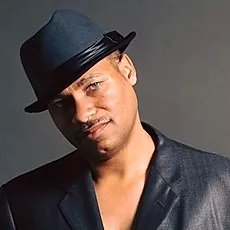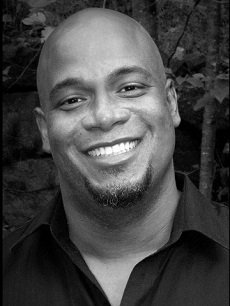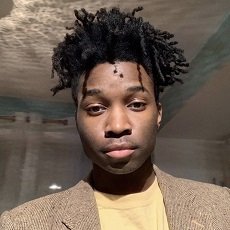
In his first year in the game development industry, David Ortiz was working as a program tester. He was 19 at the time, and his job entailed reporting bugs to the developers on the team. One day, a software bug caused white dots to appear all over the game screen, a glitch that a programmer noted one day while looking over Ortiz’s shoulder.
“Well look at that,” the programmer told Ortiz, “at least you got the cotton planted.”
“At this time I’m 19. I’m making $4.75 an hour,” Ortiz said. “They’re paying them whatever they’re paying them. Senior programmer, and I’m the kid. But he felt okay to say something that ridiculously offensive to me in the context of me just doing my job.”
Ortiz is the founder and CEO of SimWin Sports, and a member of the International Game Developers Foundation’s board of trustees. Before that, he spent more than 20 years gaining experience in the industry at companies like Microsoft, Sony, EA Sports, Warner Bros., Abu Dhabi Media, Ivey Poker, and Emortal Sports. In addition to being a veteran of video game development, Ortiz is also a black man working in an industry that remains markedly undiverse.
“You encounter racism every day for different reasons where there’s no upside and benefit from it,” Ortiz told GameDaily.
Racism, Favoritism, and Video Game Development
According to the IGDA’s 2019 Developer Satisfaction Survey, a majority 69% of respondents identified as white/Caucasian/European, and only 2% identified as black/African American/African/Afro-Caribbean. Also noteworthy is that only 7% identified as Hispanic/Latinx, a demographic that Ortiz is a part of as well.
“The black and Hispanic community is very underrepresented,” he said, “but it does seem like there’s some promise that the conversations are happening now. With things like what’s happened this past couple of weeks, hopefully there’s even more concentrated effort.”
Ortiz is referring to the upwelling of nationwide protests in the wake of the May 25th murder of George Floyd at the hands of Minneapolis police. In the weeks since, activists in every state in the country have taken to the streets in dissent against the systemic and blatant racism that exists in all sectors of society.
As a result, we’re seeing companies from across all business segments–from Netflix to Glossier and everything in between–issue statements in solidarity with the Black Lives Matter movement, and pledge to reexamine their internal biases and hiring practices.
The trend extends into the video game industry as well: several major publishers and developers like Sony, Microsoft, Nintendo, EA, Ubisoft, and countless others have made public-facing declarations of support. Even Activision Blizzard said it condones Black Lives Matter, a move that some are calling hypocritical.
For Tony Barnes, founder of upstart indie developer RetroNinja, discrimination is a baked-in quality of the games industry, which he has been a part of since 1985. During his career, Barnes has held positions as a design director at Amazon, and lead designer at EA and Rockstar. Before that, he worked at The Collective and THQ.
Over the years, he has seen and experienced a number of racially-charged and discriminatory incidents.

“I had interviewed with a company, for the lead designer position,” he explained while omitting names in an effort to not burn bridges. “It was a lock and I was flown in as a formality to meet the team. When I arrived, the studio head met with me and the first thing he said was ‘you don’t look how you sound.’ I told him ‘I get that a lot,’ and chuckled. Well, after talking with him, he left and came back to let me know that the other people I was supposed to meet with were ‘sick’ and couldn’t make it.
“Obviously, I didn’t get that job.”
Barnes said that this experience left a lasting impact on him, which he carried with him into his interview at The Collective.
“I actually said to the creative director on the phone, ‘just wanted to let you know, I’m black.’ He said, ‘okay, not sure what that means. Is that a problem?’ I told him that it was for the last place. He laughed and said, ‘their loss.’”
That Barnes felt the need to clarify that he is black is illustrative of the caution that people of color are forced to exhibit in an industry rampant with intrinsic bias.
This is a quality that Ortiz also highlighted: when asked why he remained in the industry after his colleague’s cotton plant comment, Ortiz said that, as a black man in the industry, all you can do is roll with the punches with an eye toward a better future.
I’ve been black my whole life. By the time I am 19, I have been black for 19 years and had experienced worse racism just walking down the street,” he said. “In that scenario, I was like well, I’m at work and getting paid to be here, and I am not going to quit or react violently in a way that lets this guy remove my ability to be in the industry I have dreamed of being in because he’s an idiot.
“Sometimes you just take it on the chin,” he continued. “But I didn’t sit there frustrated–you let it drive you to be successful, and let that success be your response. Now, 25 years later, I have a chance to work with a group like IGDA Foundation to try and help impact change for others. If I had bailed out then I wouldn’t have the opportunity help contribute to change in the industry today.”
He also shared a story that is reflective of the larger discussion happening around institutionalized racism.

“When I was working at the beginning of my career, I was just leaving my job in Milpitas and driving home 15 minutes plus traffic to Fremont,” he said. “Because I was a black person leaving a technology company, I got followed by private security. Then they called the local police, had them come, pull me over and search my car. He ripped it apart without any cause whatsoever because I was leaving a technology company in the area, and he suspected I might’ve stolen something even though I had been working at that company for three years driving the same car.”
Ortiz’s, whose advocacy for diversity dates back to before he joined the IGDA Foundation, noted that racism in the development sector has become so normalized that many people don’t even realize that they’re engaging in offensive behavior. For example, while working on a project, it never occurred to programmers to include black people until they decided to make in-game versions of the development team.
“Because they hadn’t accounted for the possibility of there being a black character in the game, they had no base model that had a black neck,” Ortiz explained. “The black people were myself and one other guy, and the characters had to have their faces painted onto a white character model. It was literally digital blackface.”
Ortiz said that they fixed this issue in updates later on, but the fact remains that the industry is so whitewashed that the idea of a black character wasn’t even a blip on the radar.
Until apparent industry-wide action is taken, and changes become observable, company statements touting diversity and solidarity are simply platitudes. To foster such change requires a foundational shift in how the business of games is run.
“The games industry should adopt the very same ideas of the Black Lives Matter movement, understanding that we must work toward an inclusive world of dignity, identity, and justice in a world where every person’s individual humanity is recognized and affirmed. This goal is especially relevant when dealing with the systematic racism and oppression that has plagued people of African descent worldwide.”
That statement is from Carl Varnado, the chairman of Black in Games, a special interest group under the IGDA umbrella that advocates for equality in the games industry. Varnado said that in order to fix a broken system, you have to look at it from a point of view different from the one that resulted in discrimination in the first place. He likened it to the actual process of building a video game.
“Diversity in the games industry is like a broken game mechanic: individuals see a couple of people of color and become satisfied with 1% representation of African Americans in the Industry,” he said. “This ‘normal’ is similar to when a game mechanic is overused or underpowered–monotony sets in and the game and industry becomes boring, repetitive, and stagnant. The true goal of each industry member should be creating the best teams, with divergent backgrounds and experiences who push the industry and the medium forward.”
Varnado said that allyship is shown by taking responsibility to correct injustice, corruption, and racism when the powerless are unable to speak for themselves. Leaders in the games industry should trust the advocates, and address the discriminatory policies that plague the business by creating programs designed specifically to combat bias in company environments.
Ortiz acknowledged that change doesn’t occur overnight, but from a humanitarian standpoint it’s a moral and ethical obligation to at least begin the process. Of course, there are logical aspects to greater inclusion as well.
“If you’re trying to sell a product to the world, wouldn’t you want a representation of the world as part of the team?” he asked.
Time to Listen
The problem of underrepresentation people of color see within the games industry is not limited to the development side of things. Games media is also historically unbalanced, with the vast majority of the field being white. For Danielle Riendeau, editor in chief of Fanbyte, this is an issue that is in desperate need of attention.
“Using our platform to try and amplify more black and brown voices at this time is, well, it’s the least we can do,” Riendeau told GameDaily. “All of our staff is heartbroken right now, disturbed by what’s going on, which, to be clear, is police-sanctioned murder of black folks, and subsequent violence on protecters. And we’re angry as hell.”

Riendeau said that Fanbyte has been making a concerted effort as of late to spotlight writers of color, to provide them with the platform that the industry has historically withheld. Features and statements addressing current events by professionals of color like Natalie Flores and Nicholas Grayson showcase action behind the sentiment, but Riendeau acknowledges that there is still a long way to go.
“As a person with some modicum of power in this industry–at least to seek out, partner with, and commission work from marginalized voices–I don’t think we’ve done enough. Fanbyte’s staff is diverse in some aspects, but this is something we will actively pursue as we move forward. There’s a lot of work to be done.”
John Warren, editor at large of Fanbyte, echoed his colleague’s dedication to spotlighting marginalized voices, while also admitting that the outlet needs to walk the walk if true progress is to be forthcoming.
“Diversity and quality are synonyms when you consider how different lived experiences shape how we explore video games and tv shows and anime and film and sports and wrestling and life,” Warren told GameDaily. “Black voices, brown voices, indigenous voices, queer voices, disabled voices; they’re vital to understanding and loving our world. Opportunities for those voices to be heard continue to be way too slippery in games media, and often they don’t pay what is truly owed for that time and energy.”

From a business standpoint, Warren said that Fanbyte’s vocal support of Black Lives Matter and the ongoing protests may have alienated some potential advertising partners, but now isn’t a time to get hung up on company finances.
“I know that speaking the truth when it’s not expedient makes some marketing executives skittish,” he said. “We’re still here. We’re still paying a group of writers and creators I would put up against any in the industry. We’re still paying freelancers faster than our competitors because we think that’s important.”
The freelancers that Warren is talking about face even more difficulties, an issue that is exacerbated by simply existing as a black person in the industry. Freelance journalism is already fraught with month-to-month uncertainty, but a lack of representation in the field can add an extra layer of frustration for black writers.
“I started following games journalism when I was 12, and back then there was not a single person of colour on any staff I saw,” freelance games writer Funké Joseph told GameDaily. “Over the years I’ve seen more get added to teams, but it’s still a strikingly low number. I feel like I can count all of the black games writers on my hands.”
Joseph, whose point of view as a black games writer affords them a magnified view of the innate inequalities of the field, said that the ideal team is full of people with vastly different life experiences and expertises. This has never been a priority for game sites, though. Instead, they have noticed the same handful of mostly-white writers rotating from outlet to outlet while writers of color remain ignored and unheard.
“I want new marginalized faces to get a chance to write. I want them to be able to write about their experiences without being pigeon-holed, and I want them to be able to write whatever silly and interesting thing that comes into their mind,” Joseph said.
Like the companies making statements in solidarity with Black Lives Matter, many editors have claimed to be making more of an effort to diversify their teams. In theory, the rise of social media provides a venue through which the public can hold these editors accountable, but things remain largely the same as far as Joseph is concerned.

“It’s basic representation, but putting black people in visible positions at outlets would encourage more black people to want to cover games in general,” they said. “Black people in games have had to create their own spaces to feel welcome, but if outlets fostered, collaborated with, or hosted those voices as regular talent I think things could start changing more rapidly.”
Black Lives Matter
As in the rest of society, the games industry sufferers from a terrible imbalance between white and black people. It’s a systemic problem that has been allowed to fester unaddressed for decades. Today, with the killing of George Floyd, Breonna Taylor, Eric Garner, Michael Brown, and countless others has lent Black Lives Matter strong momentum. And things appear to be near a tipping point. Hopefully, at least.
It’s a long road ahead, though, and the industry needs to be willing to listen. If business leaders opened their ears and took to heart the core messaging of Black Lives Matter–that black people have been facing lopsided adversity in all aspects of life over the course of generations–they might understand why it’s important to take action rather than simply issue a statement on Twitter.
After all, video games are the most lucrative and popular entertainment medium in the world. As such, the teams that make and write about games ought to echo the scope of this audience. If a player can’t see themself reflected in the most prevalent artform in existence, there’s something deeply wrong.
“Fostering diverse and inclusive teams is incredibly important in video game development,” Varnado said. “Development teams need to resemble the audience of their product. It forces companies and studios to think about how games are represented in the tone, in the art, and presentation of ideas. A diverse point of view sharpens a whole team’s perspective and builds authentic support for the community.”
Stories like the ones Ortiz and Barnes told–of racism and lost opportunity–are all too common, and the games industry has a responsibility to ensure that such occurrences are not simply made uncommon, but eliminated entirely. “Black Lives Matter” isn’t a platitude, it’s a call for tangible societal change that needs to sweep across every single sector of humanity, game development included.
Sam, the Editor-in-Chief of GameDaily.biz, is a former freelance game reporter. He's been seen at IGN, PCGamesN, PCGamer, Unwinnable, and many more. When not writing about games, he is most likely taking care of his two dogs or pretending to know a lot about artisan coffee. Get in touch with Sam by emailing him at sdesatoff@rektglobal.com or follow him on Twitter.
 GameDaily.biz © 2025 | All Rights Reserved.
GameDaily.biz © 2025 | All Rights Reserved.